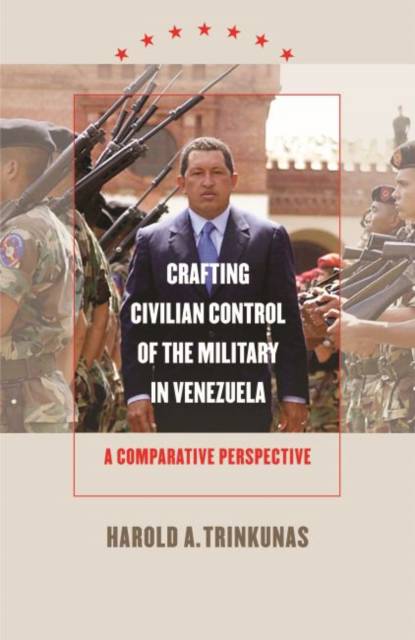
- Afhalen na 1 uur in een winkel met voorraad
- Gratis thuislevering in België vanaf € 30
- Ruim aanbod met 7 miljoen producten
- Afhalen na 1 uur in een winkel met voorraad
- Gratis thuislevering in België vanaf € 30
- Ruim aanbod met 7 miljoen producten
Zoeken
Crafting Civilian Control of the Military in Venezuela
A Comparative Perspective
Harold A Trinkunas
Paperback | Engels
€ 57,95
+ 115 punten
Omschrijving
Unlike most other emerging South American democracies, Venezuela has not succumbed to a successful military coup d'etat during four decades of democratic rule. What drives armed forces to follow the orders of elected leaders? And how do emerging democracies gain that control over their military establishments? Harold Trinkunas answers these questions in an examination of Venezuela's transition to democracy following military rule and its attempts to institutionalize civilian control of the military over the past sixty years, a period that included three regime changes.
Trinkunas first focuses on the strategic choices democratizers make about the military and how these affect the internal civil-military balance of power in a new regime. He then analyzes a regime's capacity to institutionalize civilian control, looking specifically at Venezuela's failures and successes in this arena during three periods of intense change: the October revolution (1945-48), the Pact of Punto Fijo period (1958-98), and the Fifth Republic under President Hugo Chavez (1998 to the present). Placing Venezuela in comparative perspective with Argentina, Chile, and Spain, Trinkunas identifies the bureaucratic mechanisms democracies need in order to sustain civilian authority over the armed forces.
Trinkunas first focuses on the strategic choices democratizers make about the military and how these affect the internal civil-military balance of power in a new regime. He then analyzes a regime's capacity to institutionalize civilian control, looking specifically at Venezuela's failures and successes in this arena during three periods of intense change: the October revolution (1945-48), the Pact of Punto Fijo period (1958-98), and the Fifth Republic under President Hugo Chavez (1998 to the present). Placing Venezuela in comparative perspective with Argentina, Chile, and Spain, Trinkunas identifies the bureaucratic mechanisms democracies need in order to sustain civilian authority over the armed forces.
Specificaties
Betrokkenen
- Auteur(s):
- Uitgeverij:
Inhoud
- Aantal bladzijden:
- 312
- Taal:
- Engels
Eigenschappen
- Productcode (EAN):
- 9780807856505
- Verschijningsdatum:
- 31/10/2005
- Uitvoering:
- Paperback
- Formaat:
- Trade paperback (VS)
- Afmetingen:
- 155 mm x 235 mm
- Gewicht:
- 453 g

Alleen bij Standaard Boekhandel
+ 115 punten op je klantenkaart van Standaard Boekhandel
Beoordelingen
We publiceren alleen reviews die voldoen aan de voorwaarden voor reviews. Bekijk onze voorwaarden voor reviews.











